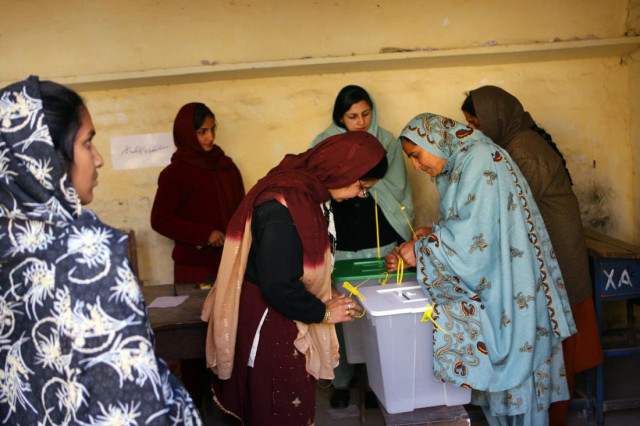Senate panel clears bill for vote count based on gender
The bill seeks an amendment to Representation of the People Act of 1976

PHOTO: FILE/ONLINE
The bill titled ‘The Representation of the People (Amendment) Bill, 2016’, seeking an amendment to the Representation of the People Act (RPA), 1976, was introduced in the Senate by Sherry Rehman of the PPP on March 7.
Convened by Senator Farooq Hamid Naek, the subcommittee of the Senate Standing Committee on Parliamentary Affairs examined the recommendations presented by the Election Commission of Pakistan.
The subcommittee included the mover of the bill Senator Sherry Rehman and Senator Nawabzada Saifullah Magsi.
The convener of the subcommittee said the ECP had presented effective recommendations regarding the bill.
The subcommittee approved to amend Section 78(ii) of the RPA which defines ‘corrupt practice’ during the election. Now stopping women from exercising their right to vote or any agreement to this end will also be included in ‘corrupt practices’. Under the new amendments, tribunals and the election commission have been empowered to declare any such election null and void in the relevant constituencies.
Meanwhile, under amendment to Section 103-AA, the decision of the election commission will be challengeable in the Supreme Court – instead of a high court – and the matter will be decided within a period of 30 days. Prior to this, it was unclear as to where an appeal can be filed against the commission.
The subcommittee was constituted by the Senate Standing Committee on Parliamentary Affairs, spearheaded by Senator Saeed Ghani, and tasked with submitting a report on the bill.
Earlier, the bill was deferred by the committee in May to allow members to consult their parties. In the same meeting, a senior official of the election commission opposed the bill, arguing that a losing candidate may take advantage of the proposed law by preventing women from voting to derail the election.
“The Statement of Objects and Reasons” attached to the bill says that “there have been numerous reports at every election in recent years whereby women voters have been restrained from voting in the election as a result of an agreement or understanding between different persons which have included politicians, persons representing political parties, the clergy and leaders of the community.
“The process of systemically disqualifying women is a clear violation of their fundamental rights and amounts to an outright discrimination and negation of rights guaranteed under Article 25 of the Constitution. This bill seeks to address such barriers.”
Moreover, it says: “The bill seeks to make available gender disaggregated data not only an effective, transparent and clear method of documentation, but also a tool to identify gender breakdown of voting structures and to identify and understand the number of women voting, the issues they face and how to eliminate them.”
Published in The Express Tribune, September 20th, 2016.



















COMMENTS
Comments are moderated and generally will be posted if they are on-topic and not abusive.
For more information, please see our Comments FAQ